A CEO and Her Successor Talk Transitioning Power (the Right Way)
October 04, 2019 | Filed in: Woman of the Week
For the past ten years, Jessica Greer Morris (along with co-founder, Ashley Marinaccio) has built and led Girl Be Heard, a nonprofit that helps girls develop and amplify their voices through theater, music, and dance. The organization runs after-school and weekend programs in underserved areas of New York City, where it encourages dialogue about social justice issues ranging from gun violence to sex trafficking. Participants have performed at the White House and the United Nations and received grants to spread their teachings at other stages around the world. In short, Girl Be Heard has become a huge success—which is why Jessica is now ready to step aside and let another leader take the reins. Enter Chiwoniso Kaitano, a former human rights advocate who is now poised to build on Jessica’s work and take Girl Be Heard into the future. Here, both women talk about the handover process, why it’s rare to hear a collaborative story like theirs, and how important it is to mind-meld about leadership and self-care.
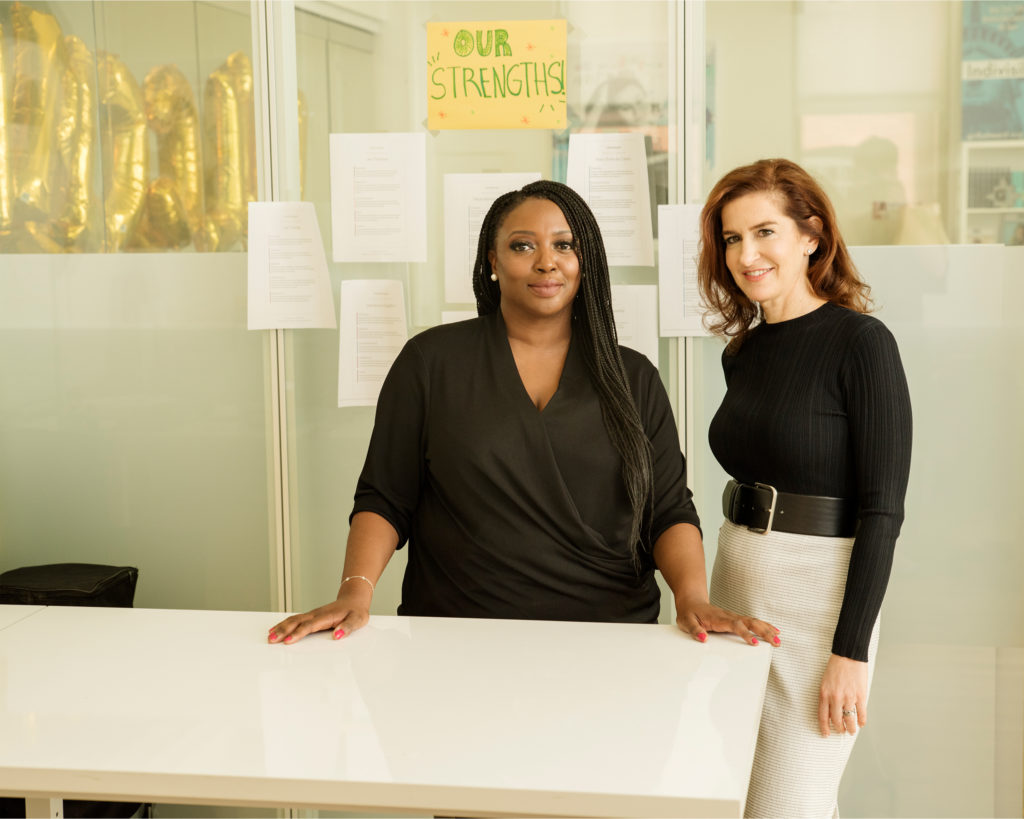
Chi is wearing the Deneuve top and the Ponza earrings. Jessica is wearing the Brodie top, the Beebe belt, the Cobble Hill skirt, and the Bezel earrings.
You both have fascinating career backgrounds that are hugely different but also similar in many ways. Can you tell me about them?
Chi: I started off my professional career as a human rights advocate here in New York. But long before that, I was a child actor, and I earned my first paycheck at 13 for a voiceover job for the BBC. Then I went to university to study law, specifically in human rights. I did that for a little bit and then moved more into NGO work. I’ve been on both sides of the non-profit world, both as an independent consultant working with non-profits to resolve systems and also on the inside, running smaller non-profits as well as large-scale projects for bigger non-profits. And beyond that, I’ve had many jobs. I worked as a bartender when I was in college. That was one of my favorite jobs, because I love interacting with people. I also had a short stint as an investment banker. So I’ve done many things. Most of them have been enjoyable experiences. But for the last six years, working in the non-profit world, I feel like I’m home. Everything I’ve done has led me to this point.
Want more M.M.? Sign up for our newsletter.
Jessica: Whenever I hear Chi speak, it’s so striking how much we have in common. I also worked in bars and restaurants in my early adult life, and I remember people saying, “Oh my god, isn’t that an awful job?” And I was like, “No! I love being of service to people.” I think that to be a C.E.O. and lead an organization, you have to love working with people and love those you serve. Also, you can’t be a one-trick pony. You can’t just be good at finances, or just be good at fundraising, or just be good at theater production. You have to do many different things at once and think on your feet, literally. And no matter how hard you work, there will be people who are really pleased with you and people who you are never, ever going to please. It’s essential that you learn to water the flowers and not the weeds. That doesn’t mean you don’t address problems, of course. You need to look at the problems and learn from them, but not stare.
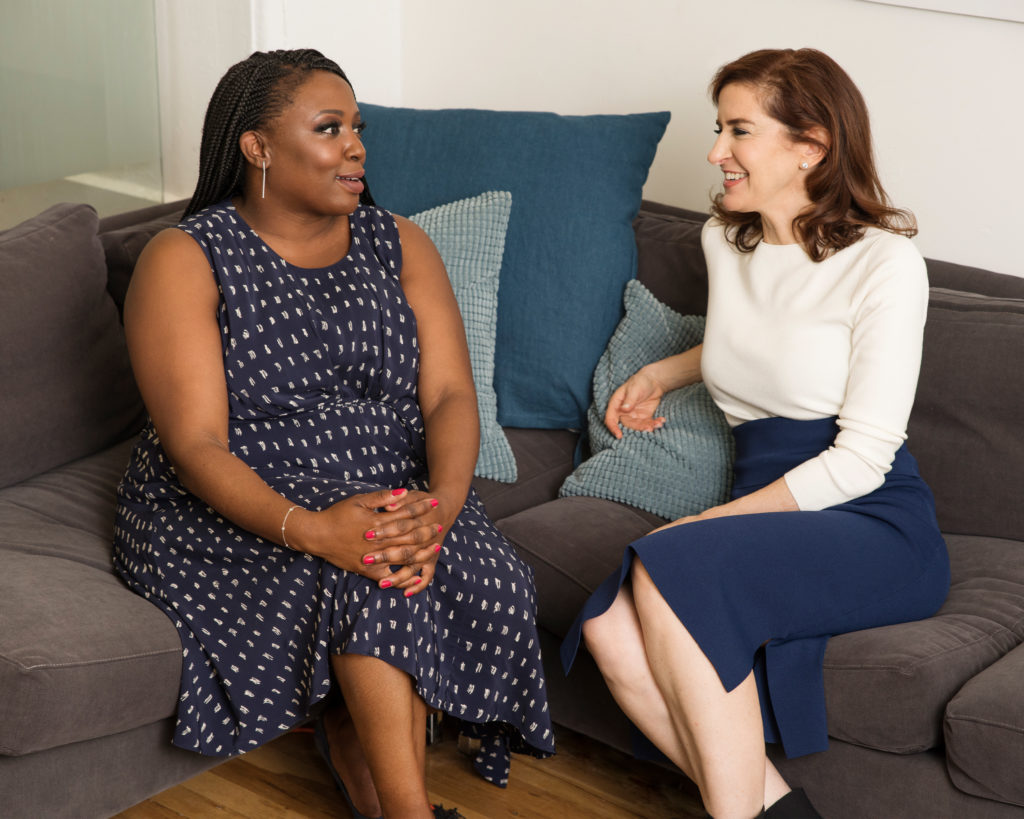
Chi is wearing the Samantha dress, the Williamina earrings, and the Five Stone bracelet. Jessica is wearing the Bezel earrings, the Celeste top, and the Harlem skirt.
It can be difficult to transition roles. I’m sure you’re both eager to share knowledge with each other, but you also have distinct styles and don’t want to step on toes. How have you navigated this process?
Chi: This is my second time becoming an executive director, so I’m not totally new at the rodeo. But Jessica and our board of directors have made this onboarding process really seamless, and there are two aspects to that. First of all, there are lots of logistical things that have been done right. The way that they transferred administrative knowledge has been by the book. Girl Be Heard is such a functional organization and has processes in place, and the team is so strong. So it’s been very easy to adapt to the organization’s internal workings and culture in that way.
The second aspect is less tangible. When I first met Jess during the interview process, I felt right away she was a kindred spirit. I understood intrinsically who she was. Nobody knows better than another executive director how incredibly, incredibly tough it is to run a non-profit. And even more so, how incredibly tough it is to start a non-profit and to build it from basically zero to a million-dollar-plus organization, and growing. You sacrifice your life, and I do not say that lightly. You miss so many things in your family and personal life, because you have given yourself to this cause. And I saw that in Jessica right away.
From the outset, I felt I was meeting with a friend—someone who was really mentoring and guiding me in the thing that she had built. Jessica and I had long and deep conversations about some of the things that she had wanted to accomplish and had been unable to, and that I now had an opportunity to take forward. We had long conversations about the wonderful team that she had built and how we could make it even stronger as we grow. And we’ve also had conversations about the kinds of self-care you need as someone who leads in an organization, because it’s a tough job, and it will take a lot from you.
“I never, ever wanted Girl Be Heard to be a personality-driven organization, because those organizations fail, and they’re often also driven by ego. You really want to be mission-driven, and value-driven, and vision-driven.”
Jessica: I do believe that there are different leaders for different times, and I’m a quintessential entrepreneur. I like inventing things where there’s nothing. And as I move fast, I break things. I like fixing huge problems. And now that Girl Be Heard is established, financially stable, and has this great leadership team in place, it is ripe for a new leader. And I feel like Chi is such an incredibly different leader than me. She is a listening leader, an intentional leader, a thought leader, but also steeped in human rights law. How lucky did we get?
In some ways, I’ve been planning this transition from my first day on the job, when I co-founded Girl Be Heard with artistic director Ashley Marinaccio. I never, ever wanted Girl Be Heard to be a personality-driven organization, because those organizations fail, and they’re often also driven by ego. You really want to be mission-driven, and value-driven, and vision-driven. So I’ve really thought from the beginning, how can I create something that I can be really proud to turn over to new leadership? And I feel like this transition with Chi has been seamless, because she can almost finish my sentences, and she instinctively knows the right next thing to do in every circumstance—whether it’s with a program, or a major donor, or the bank account. Even with self-care, Chi senses what the staff needs. There’s an intuition that’s needed for this work as well. I feel like we’ve become very good friends, and our skills are so complementary to each other.
What’s so cool about this transition is that it reflects the values and mission of Girl Be Heard—that you’re stronger together than you are separate, which is why ensemble work is powerful. If you look in the media and see what sells, it’s not women working together. It’s not women having these flourishing partnerships or transitions of leadership. It’s women competing with each other over men or jobs. Many women are doing unbelievable, beautiful, collaborative things together, but it’s just not getting covered as much.
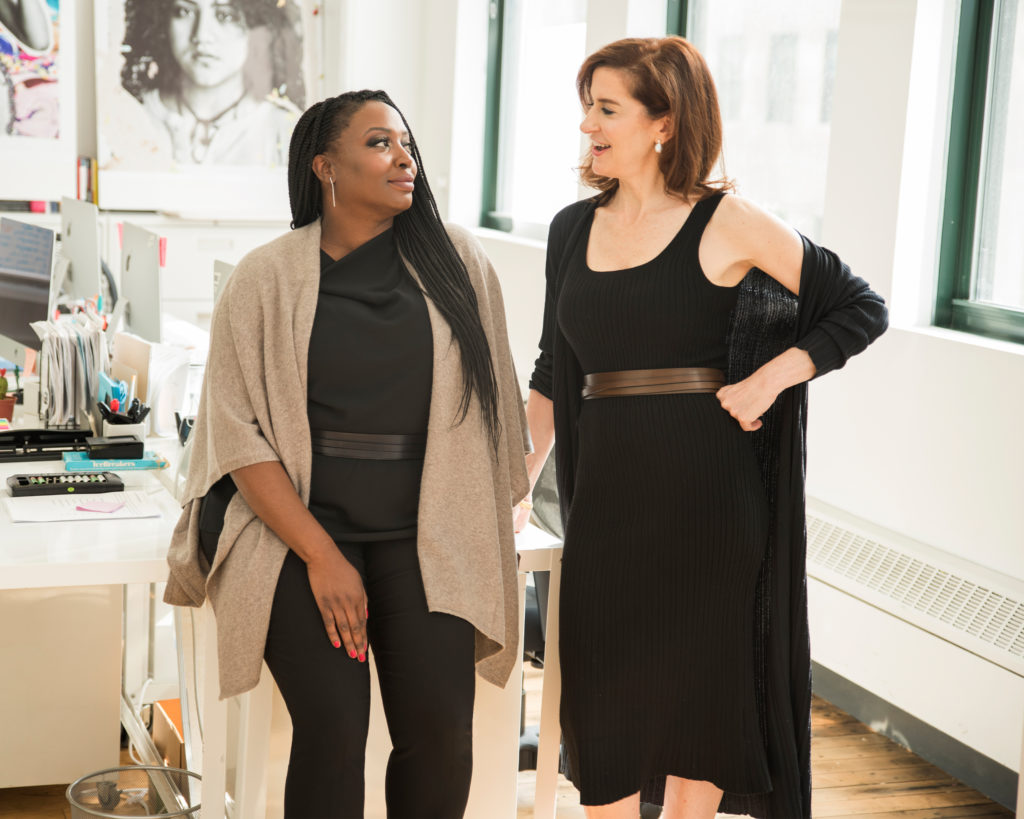
Chi is wearing the Angelou shawl, the Rowling top, the Crossover belt, the Foster pants, and the Williamina earrings. Jessica is wearing the Gwen dress, the Crossover belt, the Molly cardigan, and the Capri earrings.
It seems that your transition has been incredible, internally. But sometimes people worry when there are changes at an organization. How have you presented this leadership handover to the Girl Be Heard community?
Chi: Jess has been amazing—it is something to behold. We hosted a “farewell, hello” event, which was farewell to Jessica and hello to me. Dozens and dozens of people showed up, from major high net worth donors to city council members. We had friends and family, children, our children. Alumni who had been in the program for years, and alumni who hadn’t touched base with us for a while—they came back for this event. The room was totally representational of the ten years of this organization. And Jessica talked to every single person in the room, made a connection, took time to listen to their stories, get the update. And she introduced me to everybody that night as well, making sure I was also getting the introduction and the connection. She instinctively knows how to connect to somebody and have our mission resonate with them. She’s a master at building a community and having that community connect very, very deeply with the Girl Be Heard mission. I’m amazed by it.
Jessica: It’s so funny, because when I announced I was leaving, people started to freak out. They were like, “What about all the stakeholders, and global partners, and the funders?” And I was like, “Y’all, I’ve been planning this for nine years. Those people are not going to leave. They know that they would be abandoning me personally. Sisterhood is the basis of our work. If you don’t support Chi, not even as much but even more than you supported me, then you have failed me.” We should all be purely excited for the next steps of Girl be Heard. And if you’re a good founder, if you’re a great leader, you know when and how to let go. You know that whatever you built is much bigger than you. Girl Be Heard isn’t mine. It’s all of ours.
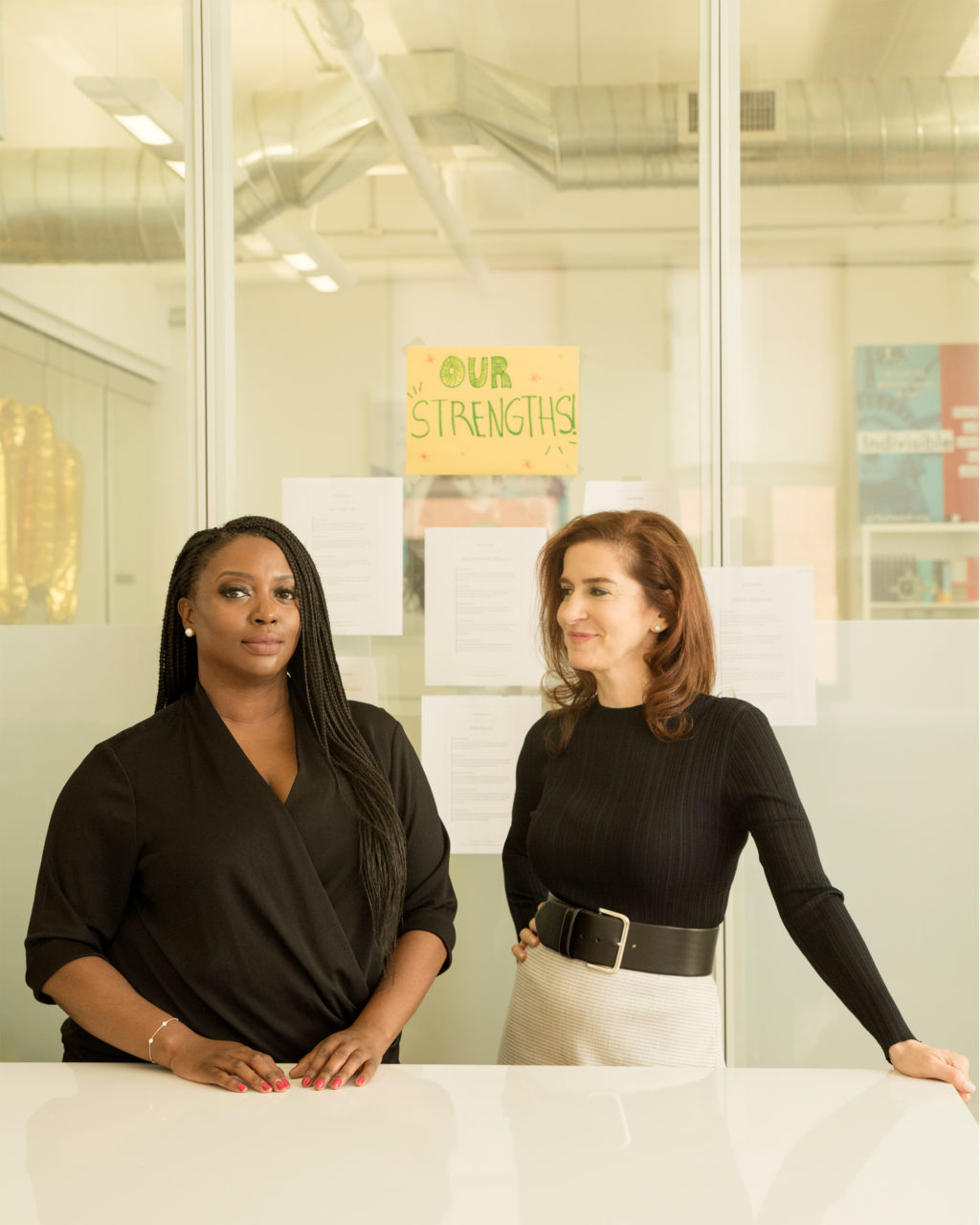
Chi is wearing the Deneuve top and the Ponza earrings. Jessica is wearing the Brodie top, the Beebe belt, the Cobble Hill skirt, and the Bezel earrings.
You both mentioned the importance of self-care. Having spent a lot of time in the non-profit trenches separately, what advice have you given each other now that you’re in the trenches together?
Chi: I have been in a job before where I did not sleep or see my child. I’ve worked 18- to 20-hour days for weeks in a row, including weekends. I’ve had those jobs. And very intentionally, a few years ago, I made the decision that it wasn’t sustainable to work that way. I know we live in a culture that prizes the 2:00am emails and not taking vacation. It’s a badge to show what a hard worker you are. Many people can do that for a while, but it’s just not sustainable.
I’m now in recovery from being a stress addict. I used to feel that my best work was done under pressure, but as I’ve gotten older and more experienced, I’ve realized that’s wrong. My best work is actually done when I get well first. When I’ve taken personal time, when I connect with my partner and my children, when I do yoga, go for a run, and really be mindful — that’s when my best work gets done. And since I’ve made that effort, I’ve noticed a real change in the last few years of my career. My productivity has gone up. I’m able to accomplish more. I am more present, both personally and professionally, really from that self-care.
“If people don’t see you go to lunch, if people see you sending emails at 2:00am, then they’re going to feel like they need to do the same thing. And so, you really need to walk the walk.”
One of my mentors many years ago told me that there is literally no job on earth that is worth martyring your mental health for. I really live by that. We love our work, and we work hard, and we do it all the time. But Jessica and I have both been in the position where you’re not sleeping because of the work. Ultimately, that means you’re failing yourself, and you’re failing people you care about.
Jessica: I want to add to that: You’re also failing your staff, because they look to you, and you set the tone of the office. If people don’t see you go to lunch, if people see you sending emails at 2:00am, then they’re going to feel like they need to do the same thing. And so, you really need to walk the walk.
I have always encouraged my staff, “I want you to spend time with your family. I want you to take lunch. Please do it.” And I used to think, just because I’m working through lunch doesn’t mean you have to do it. But it doesn’t matter how many times you say that. It’s more powerful to actually practice your self-care, and for people to see you taking lunch. To be a beacon of self-care, and to show people what self-care looks like—that’s a powerful leader. But I learned this really late. By not doing that, I think I failed Girl Be Heard at certain points. But failure is a lesson, and I think that’s why the wisdom that Chi shares is so valuable and is going to impact the organization so much.
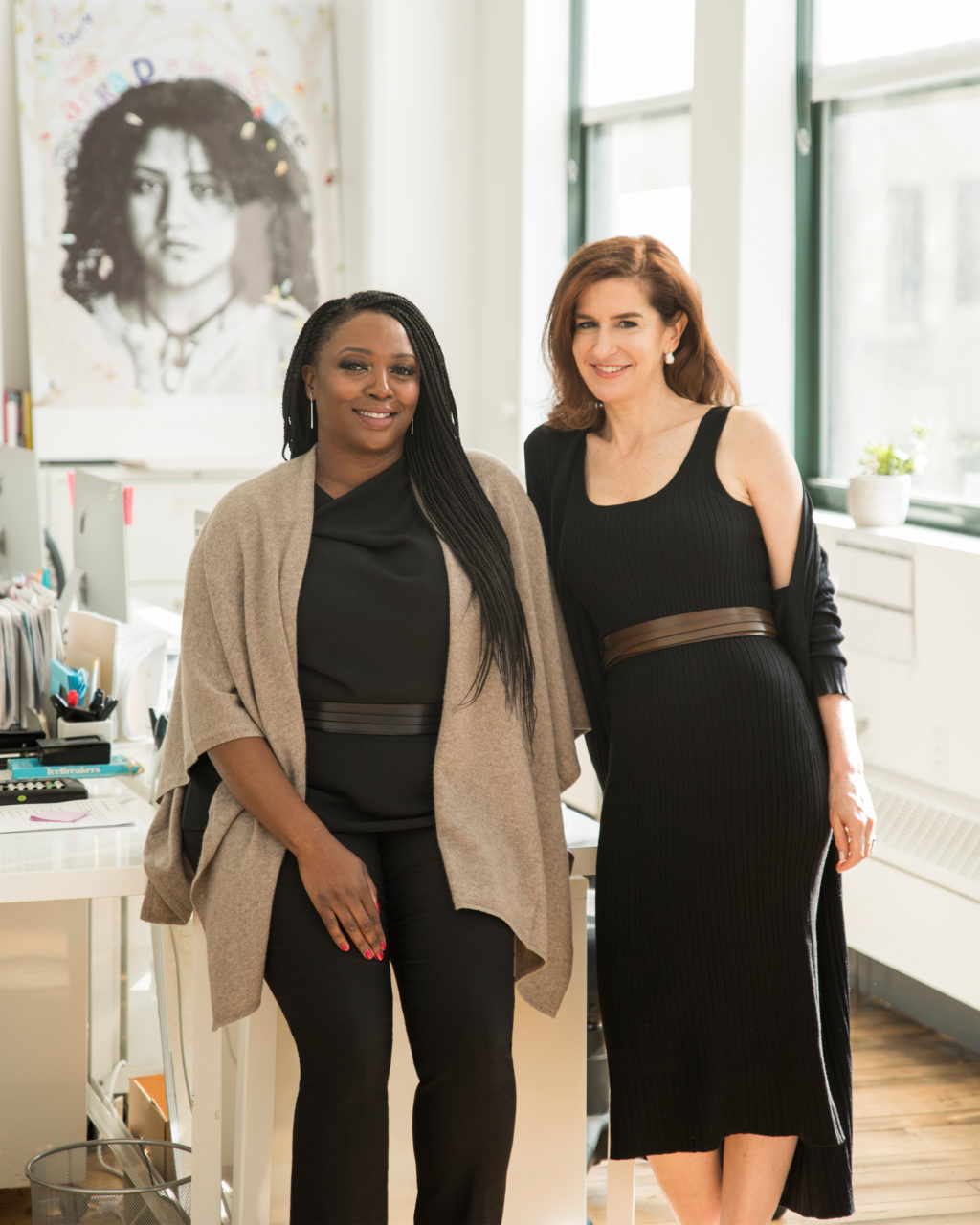
Chi is wearing the Angelou shawl, the Rowling top, the Crossover belt, the Foster pants, and the Williamina earrings. Jessica is wearing the Gwen dress, the Crossover belt, the Molly cardigan, and the Capri earrings.
Jessica, what are you excited to do once this transition is complete?
Jessica: The timing of this transition was very intentionally planned. My twin boys are juniors in high school, and I have made a real commitment not to jump into any new role that takes all of me. I want to spend some time being present with my family in a way that I haven’t always been, as we mentioned. Also, there are a lot of organizations that are in transition and need support, or that are really struggling. I love problem organization. I like to fix things, and I like the start-up environment. Working as a consultant is a great option for me. I can’t commit to a 10-year job as an executive director until my kids go to college, so I’m not going to return to that life just yet. I want to make sure that whatever I do next, it allows me to be physically and emotionally present for my family, myself, my friends, and my community in a way that I wasn’t able to do in the last ten years. That doesn’t mean that an executive can’t do that. But the start-up environment took a lot out of me.
I also am a performer, a writer, and a playwright. And I got my first acting gig yesterday. I hadn’t performed in so long, but it was a big part of my life as a moonlighter back in the day when I was doing community organizing. I spent 16 years working for city government, but I was known as “the songstress of city government,” because I had this comedy/cabaret act at night. So I am excited to return to that part of my life as well.
Chi, what are you excited to get your hands on at Girl Be Heard?
Chi: Oh my goodness, so much. One of the things I’m really excited about is that we’ve begun to talk in a very intentional way about civic engagement, youth-led movements, and what that means for our young artist activists. The administrative stuff, the performing stuff, involving our young people—what does it really look like? Not just to have this incredible platform where our voices are heard, but how does that shift policy? The majority of our young people are children of color, African American, Latinx, biracial. We’ve got trans and gender-non-conforming youth, and we’re evolving this big tent. I’m really excited to continue the dialogue and to see what actions resolve from all of these conversations that we’re having internally.
Want to nominate a Woman of the Week? Email us at womanoftheweek@mmlafleur.com.
Photos by Mattew Priestley. Styling by Nyjerah Cunningham and Ismelka Gomez.





